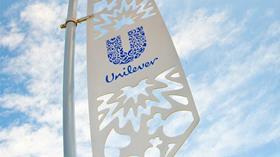
Unilever is to switch to being a single holding company based in the Netherlands in a move some onlookers are claiming is a slap in the face to the UK post-Brexit.
The Anglo-Dutch food manufacturing giant - which buys seven per cent of the world's tomatoes, 13 per cent of frozen peas and 28 per cent of frozen spinach - said it wanted to simplify its structure from two legal entities to a single one based in Rotterdam. It explained this was because its Dutch division accounts for 55 per cent of the group's share capital, and stressed the company will continue to be listed on the London, Amsterdam and New York stock exchanges.
Under its new structure, which the company said is about developing a 'simpler, more agile and more focused business', three divisions will be created - Beauty & Personal Care, Home Care, and Foods & Refreshment, with the first two set to be headquartered in London and the food division continuing to be based in Rotterdam.
Chairman Marijn Dekkers said: 'Unilever's board is fully committed to delivering long-term performance and sustainable value for shareholders. The board believes the move to three divisions and the simplification of our corporate structure will create a simpler, more agile and more focused company with increased strategic flexibility for value-creating portfolio change.
'Our decision to headquarter the divisions in the UK and the Netherlands underscores our long-term commitment to both countries. The changes announced today also further strengthen Unilever's corporate governance, creating for the first time in our history a 'one share, one vote' principle for all our shareholders.'
'Businesses need protection'
Despite Unilever, which employs 7,300 people in the UK and produces brands such as Marmite, Colman's, Bovril and Flora, insisting the move has nothing to do with Brexit, critics and analysts were quick to point the finger at the lack of political clarity over the UK's departure from the EU.
The GMB union argued the move was partly because the UK government was failing to protect big companies from hostile takeovers. 'It’s bad news for British business and a clear sign Theresa May needs to deliver the reforms that provide UK businesses like GKN and Unilever with more cover,' said GMB national officer Eamon O'Hearn. “This would be an important step in providing UK businesses with greater security ahead of the likely turbulence coming from Brexit.'
Dr Carmen Stoian, lecturer in international business at the Kent Business School, University of Kent, added: '‘Unilever’s decision to consolidate its operations and to move its headquarters from London to Rotterdam is one of the latest corporate moves that questions the impact of Brexit on the UK economy.
‘The key issue here is that the link between this move and Brexit is more subtle than anti-Brexit campaigners may claim. Indeed, Paul Polman,the company’s CEO, has said that the move was based on ‘technical reasons’. From an organisational point of view, the dual–headed structure that Unilever has enjoyed in the past is rather rare and has several limitations. Hence, the consolidation of its headquarters in Rotterdam makes business sense.
'However, the move is driven by both push and pull factors, amongst which political factors cannot be neglected. Since the British vote in the EU referendum in June 2016, governments, local authorities and business networks in various European countries have worked hard to improve the investment climate in their markets in order to attract multinationals headquartered in London that may be wary of Brexit.
'All in all, the impact of Brexit may be felt in the future not only as a result of what happens in the UK, but also as a result of the strong determination of governments of EU countries to make their markets more attractive and the new destination for foreign direct investment from multinationals based in the UK.'






No comments yet